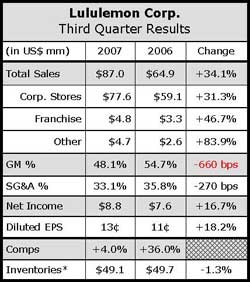Lululemon athletica inc. said it is approaching the uncertain economy by carefully monitoring its inventory and slowing store expansion.
The Canada-based maker and retailer of yoga and fitness-inspired clothing said net revenue increased 34% to $87.0 million in the third quarter ended Nov. 2, 2008.

The growth was driven by a combination of 37 net new corporate store openings since the third quarter of 2007, including 16 new stores during the third quarter of 2008. Comparable store sales increased 4% on a constant dollar basis, well short of the companys forecast of high-single-digits to low-teens growth just six months ago.
The company said it bought back three additional franchise stores and closed its final corporate-owned location in Japan during the quarter, ending the period with 107 total stores versus 70 a year ago.
The company lowered its EPS guidance for fiscal 2008 to 55 cents to 57 cents per diluted share as compared to its previous range of 68 cents to 71 cents. Revised guidance for the full year includes net revenue between $340 million and $345 million and 35 planned new store openings in North America.
Growth seems destined to slow dramatically in fiscal 2009, however, as the company slows its store expansion.
CEO Christine Day said the company was taking a “breather in some ways from growth,” shifting less resources into opening more new stores, in order to focus on growing the business within each store.
“We have five [store] deals signed for '09,” said Day. “We have basically put everything else on hold temporarily, and are actively renegotiating with landlords until we get to a level that we feel comfortable with, that can be sustained in a difficult environment.”
She said the company anticipates conditions to remain difficult at least the first six to 12 months of next year and “maybe into the next year.”
Despite its rapid expansion, she said the company had reduced its inventory at the end of the third quarter to 1% below year earlier levels.
“Looking ahead, while we did not buy the fourth quarter and Spring 2009 inventory in line with our new sales trend, we did begin buying some of our inventory strategically in what we call modules,” she said. “The goods in these modules can be rolled into our stores at any point over the next six months, as demand warrants.”
As for product categories, Day said that LULU has been very successful with the running line and is more closely integrating the yoga and dance lines. Geographically, she said the company was making dramatic progress in New York.
“I think the one area that regionally breaks out for us has been New York,” she said. “We went from one store to nine stores in a general area in a very short period of time.” She said that while that hurt comp sales at Lululemons store at Lincoln Center, it represented a “very positive growth story overall. So we definitely feel like we did the right thing in the marketplace, but that did affect our comps.”
Despite the poor economy, LULU does not plan to make drastic cuts in store payroll to save money. As one of her first moves as CEO this summer, Day insisted on recruiting and training a new tier of store managers further in advance of store openings to ensure smooth growth. At that time, the company was opening three to four stores a month.
“We have actually been able to manage our hours down in response to the situation, but still keeping a very healthy sales staff targeted for the guest experience,” said Day. “So we feel very good about where we are with that, and have been able to gain leverage on that line.”
The company, which Day says makes two-thirds of its sales in Canada, has seen lower traffic, particularly in the “mall environment stores.” She said historically, LULUs growth has come from transactions rather than foot traffic.
In an unrelated development, the company announced that its founder and Chairman Dennis J. Wilson had indicated through regulatory filings his intention to transfer or otherwise sell, through his control of LIPO Investments USA, Inc., approximately 330,000 shares of lululemon common stock. Wilson owned 25.4 million shares, or 37.6% of LULUs common outstanding shares as of Apr. 23, according to the companys most recent proxy statement.
In accordance with the LIPO USA Option Plan created prior to LULU's initial public offering, Wilson will transfer shares of lululemon common stock to certain founding employees of the company upon the exercise of awards. “The execution of this transfer will allow this group of founding employees to continue to monetize their ownership over time,” said Wilson.














